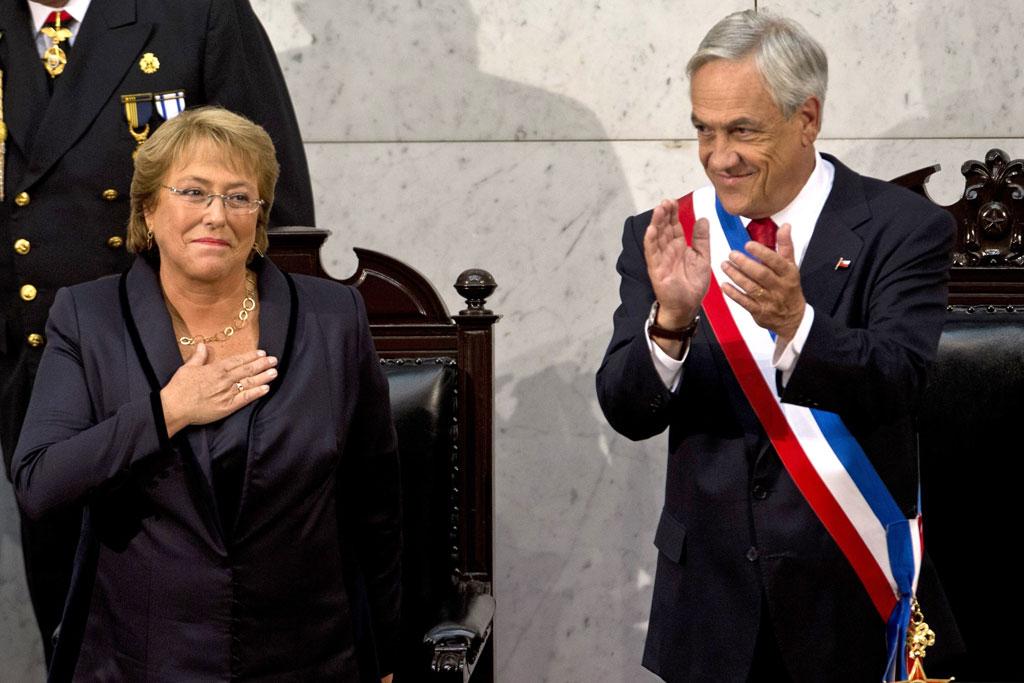Bachelet is back as Chile’s president and she wants to address social inequality
Chilean new President Michelle Bachelet (L) is applauds by outgoing President Sebastian Pinera during her inauguration ceremony at the Congress in Valparaiso, Chile, on March 11, 2014.
Michelle Bachelet took over the presidency of Chile in a ceremony loaded with symbolism on Tuesday, after promising to stick to her tax-and-spend campaign pledges despite a sharp economic slowdown.
Bachelet accepted the presidential sash from Senate head Isabel Allende, the daughter of late socialist President Salvador Allende, whose overthrow in 1973 ushered in the 17-year dictatorship of Augusto Pinochet.
Returning to Chile's top job after a spell with the United Nations, Bachelet heads a coalition that ranges from moderate leftists to communists. She wants to address social inequality in the top copper exporter by overhauling education and healthcare, funded by tax reforms.
"From day one I will work to fulfill the promises we made," said Bachelet in an interview with local TV channel Canal 13 last week.
Apart from a prickly Congress and volatile student movement, which has been vociferously demanding better, free education, she will have to deal with a struggling economy. Economic activity growth slowed to a near four-year low in January and falling copper prices and a weakening peso are taking their toll.
Bachelet's swearing-in in the port city of Valparaiso, the seat of Chile's Congress, was attended by presidents from around the region, with the notable exception of Venezuela's Nicolas Maduro, who was due to come but apparently cancelled at the last minute.
An emergency meeting of South American foreign ministers, including Venezuela's Elias Jaua, is planned for Wednesday in Santiago to discuss civil unrest in Venezuela, where at least 22 people have died in five weeks of street protests demanding Maduro's resignation.
In a possible reflection of the strategic importance of Chile — a non-permanent member of the UN Security Council — US Vice President Joe Biden was in Santiago to attend the ceremony. He has been meeting with Bachelet and other Latin American leaders. Apart from the troubles in Venezuela, Biden was expected to use his visit to discuss the TransPacific Partnership free trade agreement.
Chile and the United States are among 12 countries involved in TPP talks, though disagreements between some partners have delayed a final deal.
Unresolved issues
The 1973 coup and years of repression that followed it have left unresolved issues in Chile, with the 40th anniversary last year inflaming sensitivities just as the election campaign was getting started.
Salvador Allende committed suicide as air force jets strafed the La Moneda presidential palace on Sept. 11, 1973.
Many of his supporters fled into exile as the military cracked down on dissent, including both his daughter Isabel and a young Michelle Bachelet, who was temporarily imprisoned and tortured.
Isabel Allende (not the Chilean author, who is a distant relative) is now a Socialist Party politician and was named as the first female head of Chile's senate last month.
In that role on Tuesday she swore in Bachelet, who led Chile as its first female president between 2006 and 2010. The two women smiled and embraced as Allende placed the presidential sash on Bachelet.
Barred constitutionally from immediate re-election, the popular and charismatic Bachelet easily beat her right-wing opponent when she returned to fight for the 2013 presidential vote. She is the first Chilean leader to serve a second term since the return to democracy, and will take over from unpopular conservative Sebastian Pinera.
"Pinera was not a good president, he didn't help with health or education," said civil servant Manuel Ortega outside La Moneda, where Bachelet will make a speech later on Tuesday.
"Bachelet needs to make some serious decisions in office and I hope she will put forward solutions to help the poor."
Between presidential terms, Bachelet's activities included heading UN Women, a newly created UN entity which promotes gender equality.
(Additional reporting by Felipe Iturrieta, Fabian Cambero and Jade Hobman, Writing by Rosalba O'Brien Editing by W Simon and Tom Brown)
